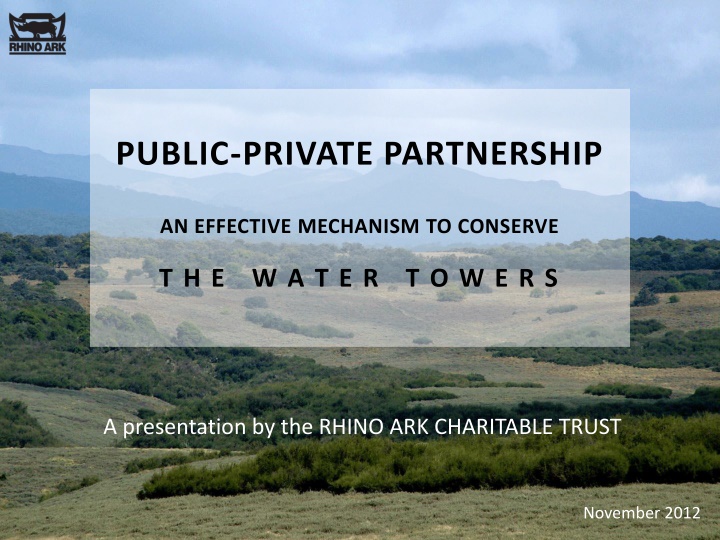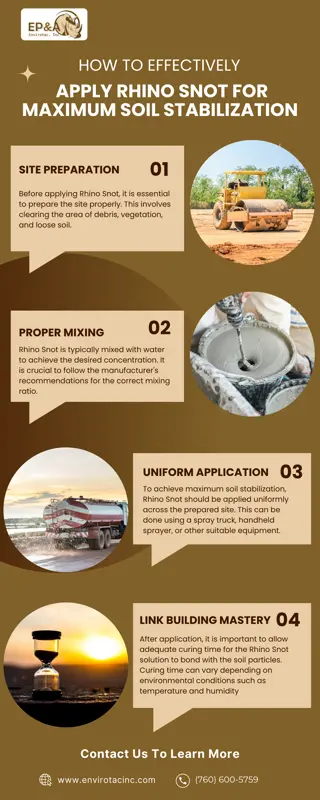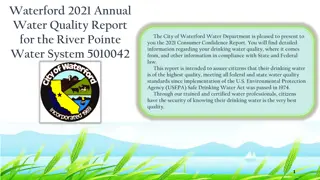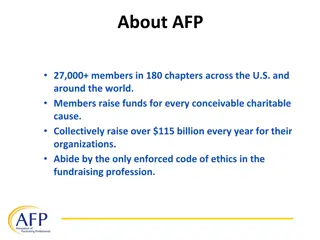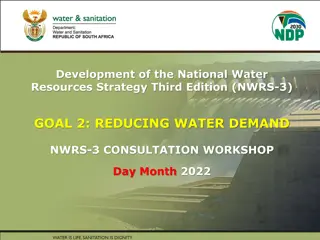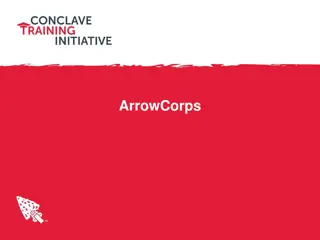Public-Private Partnership in Water Conservation by Rhino Ark Charitable Trust
Established in 1989, Rhino Ark Charitable Trust focuses on sustainable solutions for mountain forest ecosystems and biodiversity conservation through public-private partnerships. With a key emphasis on water towers like Aberdare Range and Mt. Kenya, they aim to mitigate human-wildlife conflicts and combat illegal exploitation of forest resources. The organization's success is attributed to financing, governance structures, and joint management committees involving key entities like KWS and KFS.
Download Presentation

Please find below an Image/Link to download the presentation.
The content on the website is provided AS IS for your information and personal use only. It may not be sold, licensed, or shared on other websites without obtaining consent from the author.If you encounter any issues during the download, it is possible that the publisher has removed the file from their server.
You are allowed to download the files provided on this website for personal or commercial use, subject to the condition that they are used lawfully. All files are the property of their respective owners.
The content on the website is provided AS IS for your information and personal use only. It may not be sold, licensed, or shared on other websites without obtaining consent from the author.
E N D
Presentation Transcript
PUBLIC-PRIVATE PARTNERSHIP AN EFFECTIVE MECHANISM TO CONSERVE T H E W A T E R T O W E R S A presentation by the RHINO ARK CHARITABLE TRUST November 2012
PUBLIC-PRIVATE PARTNERSHIP AN EFFECTIVE MECHANISM TO CONSERVE T H E W A T E R T O W E R S A presentation by the RHINO ARK CHARITABLE TRUST November 2012
Rhino Ark: An introduction Rhino Ark is a charitable trust established in 1989 Objectives The main objective is to develop sustainable solutions to the challenges facing mountain forest ecosystems and threatened biodiversity areas, through public-private partnerships. The specific objectives are: Mitigate human-wildlife conflicts; Reduce illegal exploitation of forest resources through controlled access to forests. Focus Originally: Aberdare National Park Currently: Water Towers, starting with Aberdare Range, Mt. Kenya and Mau Mt. Eburu
Rhino Ark: Public-Private Partnerships Rhino Ark is based on public-private partnerships Public-private partnerships are at the centre in all key areas: Financing; Governance; Implementation; Monitoring / Auditing.
Public-Private Partnership: Financing conservation work Since 1989, thousands Kenyans and hundreds companies and other private entities have supported Rhino Ark s conservation work.
Public-Private Partnership: Financing conservation work Over the years, contributions from the public sector have increased, although more erratically. Since 2011, they outstrip private contributions.
Public-Private Partnership: Governance structure Internal and external governance structures are based on PPP Internal Rhino Ark s Board of Trustees The Board includes: CEO of a Bank CEO of a group of companies High Court Judge Manager in a private conservancy Former Director of WCMD (KWS) External Joint Management Committees Projects in each ecosystem are guided by a Joint Management Committee: KWS KFS Rhino Ark
Public-Private Partnership: Governance structure Innovative governance structures based on PPP On 11 May 2012, the Aberdare Trust was launched by the Prime Minister. Management Trust This is a body based on PPP with wider community participation to: Maintain and manage the fence; Ensure that the fence objectives are met.
Public-Private Partnership: Implementation COMMUNITIES Labour for fence building / maintenance Reforestation Ecosystem surveillance (AJSU) Wildlife monitoring / education (BSP) GOVERNMENT AGENCIES Technical expertise / training Supervision / management Law enforcement RHINO ARK Fund raising Supervision / management Technical expertise
Public-Private Partnership: Benefits FINANCING Shared responsibility Broader engagement of the public Sustainability GOVERNANCE Increased legitimacy Transparency and accountability IMPLEMENTATION Direct community participation Increased acceptability Increased flexibility Reduced duplication
Public-Private Partnership: Challenges Public sector: Perception that the resources they manage belong to them Lack of understanding of the benefits of PPP Lack of appropriate mechanisms to engage the private sector Private sector: Lack of understanding on the dependency of their respective economic sector on the natural capital Lack of understanding that investing in the natural capital helps reduce business risks Perception that caring for the environment is a mere CSR activity
